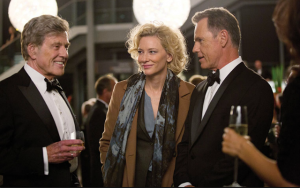TRUTH: 3 STARS. “a murky investigation into an even murkier story.”
 Made at a time when big stores are broken on Twitter truth set at a time when journalist did work the old-fashioned way, following paper trails and working the phones, “Truth” tells of murky investigation into an even murkier story.
Made at a time when big stores are broken on Twitter truth set at a time when journalist did work the old-fashioned way, following paper trails and working the phones, “Truth” tells of murky investigation into an even murkier story.
Based on the nonfiction book “Truth and Duty: The Press, the President, and the Privilege of Power” by Mary Mapes, the film begins with Mapes (Cate Blanchett) having just broken the story of the Abu Ghraib prison scandal. Her hard-hitting approach made her a journalism superstar at CBS and “60 Minutes,” the show that ran the story. Gearing up for the next season meant finding an even bigger story. Mapes put together a crack team of investigators—the jaded but idealistic Mike Smith (Topher Grace), army insider Colonel Roger Charles (Dennis Quaid) and journalism professor Lucy Scott (Elisabeth Moss)—to examine President George W. Bush’s military service. The theory, supported by the so-called Killian documents, was that Bush had received preferential treatment to avoid fighting in the Vietnam War.
The seemingly airtight story falls apart the day after airing on “60 Minutes,” calling into question the reputation of CBS News, Mapes and her team and costing anchor and news legend Dan Rather (Robert Redford) his job.
For a movie that is all about bias, or the lack thereof, “Truth” is certainly in the corner of its journalists. The much ballyhooed fair and balanced approach is largely absent as the movie paints Mapes and Company as warrior journalists on a search for the truth while everyone else is painted with a big bad Republican brush.
As Mapes Blanchett plays a scapegoat, a mix of steely nerves and vulnerability, who will do what she thinks is right no matter what the consequences. In real life Mapes was fired and hasn’t worked in television news since even though her Abu Ghraib story won a Peabody Award.
Redford brings gravitas to the role of Rather, reeking of old school trust. Rather was a link to the past, to a time when journalism wasn’t driven by ad sales or click throughs. “Why did you get into journalism?” he’s asked. “Curiosity,” he says, “that’s everything.” He viewed asking the right questions and passing along the results, pro or con, to his audience as a trust. Times changed around him and Redford captures Rather’s resignation to the new world of news with equal measures of sadness and outrage.
“Trust” is a compelling story told with a heavy hand. A slow-motion shot of Mapes’s hand, holding a remote, and turning off the TV after Rather’s retirement announcement is a bit much and some clumsy foreshadowing— just before the troublesome “60 Minutes” story airs a commercial for “Survivor” screams, “Somebody’s going to get burned!”—adds unnecessary melodrama to what should have been an even-handed look at the inner workings of the fourth estate.
